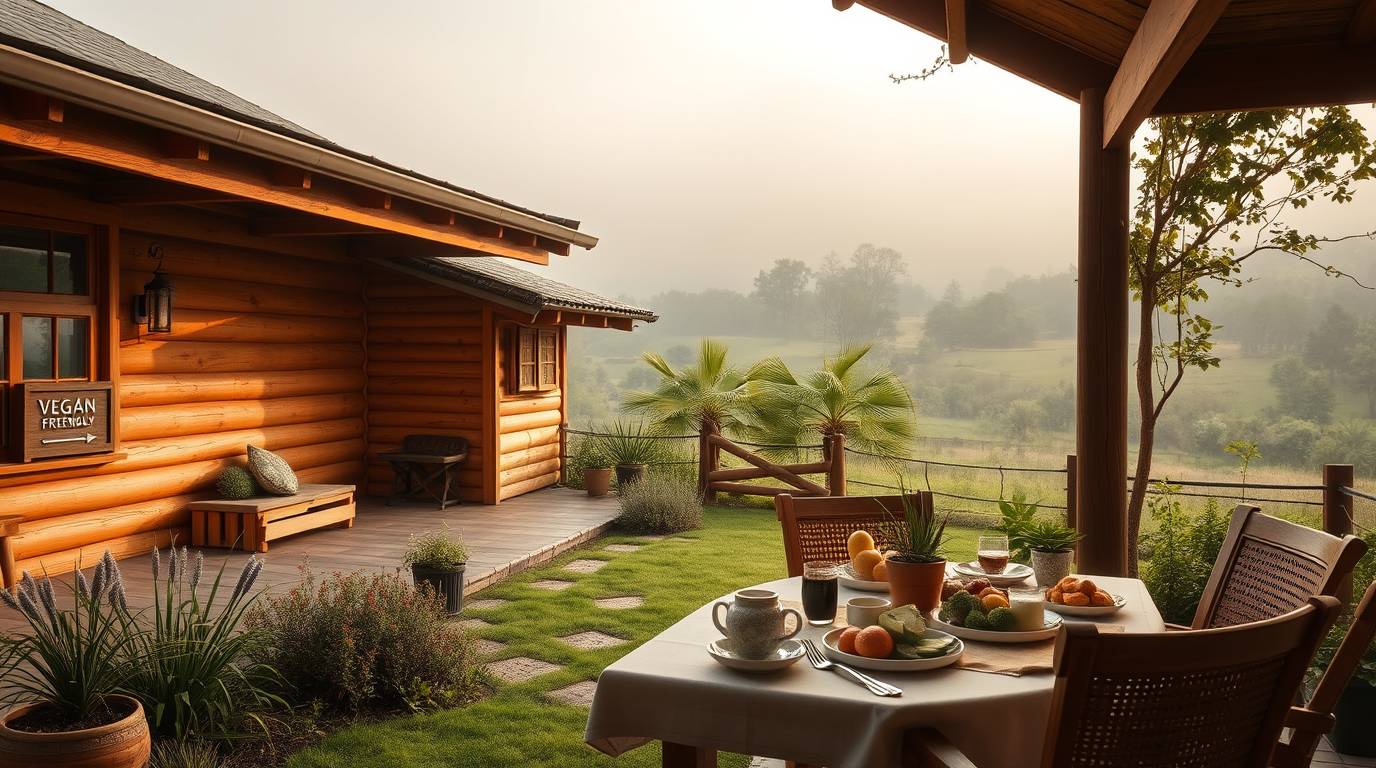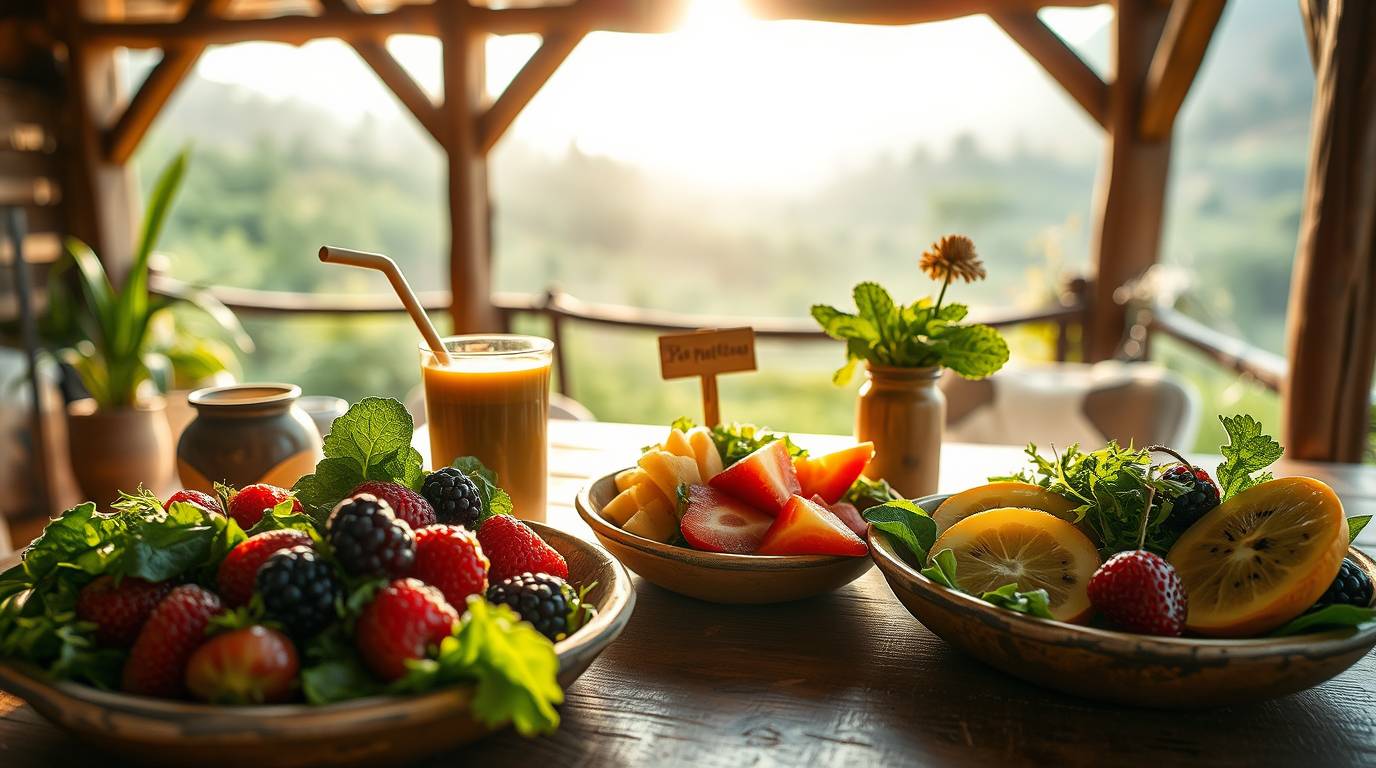Vegan Bed and Breakfast: Leading the Hospitality Trends of 2025 with Plant-Based Options
Where breakfast comes from the garden, not just a grocery store – that's the growing appeal of vegan bed and breakfasts sprouting up globally in 2025. Leveraging the plant-based movement, these establishments offer more than a stay; they deliver an entire lifestyle experience. Dive into how the shift from animal products to plant-based menus is transforming guest satisfaction and why it's so much more than just a dining trend.
Summary
In 2025, the hospitality industry is witnessing a significant shift as vegan bed and breakfasts (B&Bs) gain popularity worldwide. These establishments are not merely offering plant-based meals but are providing immersive lifestyle experiences that resonate with the growing eco-conscious and health-aware traveler demographic. By integrating sustainable practices, such as sourcing ingredients from on-site gardens and eliminating animal products, vegan B&Bs are setting new standards in guest satisfaction and environmental responsibility. This movement reflects a broader trend in the hospitality sector, where green lodging options are becoming a key driver of consumer choice.
The Emergence of Vegan Bed and Breakfasts in 2025
1. Rising Demand for Vegan Accommodations
The surge in veganism has led travelers to seek accommodations that align with their dietary and ethical values. Platforms like Veggie Hotels now list over 600 establishments worldwide, with its sister site, Vegan Welcome, featuring many more that are not entirely vegan but want to be known as vegan-friendly.
2. Notable Vegan B&Bs in the United States
Several vegan B&Bs have set new standards in hospitality:
- The Stanford Inn by the Sea (Mendocino, California): Overlooking the Pacific Ocean, this pet-friendly resort offers a complimentary plant-based breakfast and a vegan fine dining experience in the evening. The on-site restaurant composts all food scraps and provides cooking and gardening classes.
- Deer Run on the Atlantic (Big Pine Key, Florida): Situated on Big Pine Key Island, this four-room B&B uses organic products, including towels and sheets. Guests can enjoy a vegan breakfast with ocean views and may even spot the endangered key deer.
- Volcano Eco Retreat by Heart Core Hotels (Mountain View, Hawaii): Featuring Polynesian-style guest rooms, this retreat minimizes environmental impact by avoiding disposable plastics. Breakfasts are plant-based, with ingredients sourced from local farmers.
3. European Vegan B&Bs Making an Impact
Europe has also embraced this trend:
- Vegan B&B AM/PM (Bruges, Belgium): Located in a modernized old mansion, this B&B offers a full vegan breakfast with house-made waffles and baked goods. It's a short walk from the train station and Market Square.
- Vegotel (Netherlands): With locations in Schoonoord, Wyn, and Blije, Vegotel provides customizable vegan experiences, including three-course dinners and picnic lunches, or the option for guests to cook themselves.
4. Sustainability and Ethical Practices
Vegan B&Bs often incorporate sustainable practices:
- Plantonia Aparthotel (Kraków, Poland): This climate-friendly aparthotel uses vegan furnishings made from recycled materials and offers vegan, sustainable, and recyclable cosmetic products.
- Bio-Hotel Rose (Baden-Württemberg, Germany): Emphasizing environmental awareness, this hotel provides an organic breakfast buffet with regional and vegan options, along with certified organic natural cosmetic products.
5. Economic and Social Implications
The rise of vegan B&Bs reflects broader economic and social trends:
- Increased Market Demand: The plant-based food market in Italy, for example, reached €641 million in 2023, marking a 16% increase compared to 2021.
- Consumer Preferences: Travelers are increasingly seeking accommodations that align with their ethical and dietary choices, prompting the hospitality industry to adapt.
6. Future Outlook
The emergence of vegan B&Bs signifies a transformative period in hospitality. As consumer preferences continue to evolve, the industry is likely to see further growth in plant-based and sustainable accommodations, catering to a more conscious and diverse traveler demographic.

How Plant-Based Menus Enhance Guest Satisfaction
Meeting Evolving Guest Preferences
Today's travelers are increasingly seeking accommodations that align with their dietary choices and ethical values. By offering plant-based options, bed and breakfasts can attract a wider demographic, including vegans, vegetarians, and flexitarians. This inclusivity fosters a welcoming atmosphere, encouraging positive reviews and repeat visits.
Enhancing Culinary Creativity
Plant-based menus challenge chefs to innovate, leading to the creation of unique and enticing dishes. For instance, a luxury hotel in Bangkok expanded its plant-based offerings, introducing items like satay tempeh skewers and cinnamon French toast, which have been well-received by guests.
Such creativity not only satisfies dietary needs but also elevates the overall dining experience.
Promoting Sustainability and Health
Offering plant-based meals aligns with sustainable practices by reducing the carbon footprint associated with animal agriculture. A study from the University of Surrey found that prioritizing vegetarian options on hotel menus can significantly decrease carbon emissions.
Additionally, plant-based diets are often associated with health benefits, appealing to guests seeking nutritious meal options.
Implementing Effective Menu Strategies
The presentation of plant-based options plays a crucial role in their popularity. Research indicates that integrating vegetarian dishes alongside traditional offerings, rather than in separate sections, increases their selection.
Descriptive language emphasizing flavors and textures, such as "Cumberland-spiced veggie sausage and mash," can also make these dishes more appealing.
By thoughtfully incorporating plant-based menus, bed and breakfasts can enhance guest satisfaction through inclusivity, culinary innovation, sustainability, and health-conscious offerings. This strategic approach not only meets the evolving preferences of modern travelers but also positions establishments as forward-thinking and responsible members of the hospitality industry.

Sustainable Practices Defining Green Lodging Trends
1. Eco-Conscious Construction and Design
Hotels are increasingly utilizing sustainable materials such as reclaimed wood, bamboo, and recycled metal in their construction and furnishings. This approach minimizes waste and lowers the environmental footprint of new developments. Design strategies now emphasize natural light and ventilation, reducing reliance on artificial lighting and climate control systems. Features like green roofs, rainwater collection systems, and biophilic design elements create inviting spaces that connect guests with nature.
2. Advanced Water Conservation Measures
Addressing global water scarcity, hotels are implementing smart water management systems. These include low-flow showerheads and faucets, greywater recycling for non-potable uses, and smart irrigation systems for landscaping. Engaging guests through educational materials and incentivizing reduced linen and towel usage further supports water conservation efforts.
3. Waste Reduction and Circular Economy Practices
The shift towards a circular economy is evident as hotels replace single-use plastics with refillable dispensers and biodegradable alternatives. Recycling programs now encompass electronics, textiles, and construction materials. Instead of discarding furniture and décor during renovations, many properties refurbish or donate these items, significantly reducing waste and promoting sustainability.
4. Sustainable Food and Beverage Initiatives
Hotels are rethinking their food and beverage operations by partnering with local farms to offer organic, seasonal produce, thereby reducing food miles and supporting local economies. AI-powered systems monitor food waste and optimize inventory, while composting has become standard practice. The elimination of single-use plastics in dining areas, replaced by reusable glassware and biodegradable straws, further underscores the commitment to sustainability.
5. Integration of Smart Technologies
The adoption of digital technologies enhances sustainability efforts. Contactless check-ins, keyless room entry, and guest messaging platforms reduce paper and plastic use. Digital guest room tablets eliminate the need for paper menus and directories. Smart thermostats and lighting systems adjust settings based on occupancy, cutting unnecessary energy use. In-room sustainability dashboards display real-time energy and water usage, encouraging guests to be more mindful of their impact.
6. Eco-Friendly Housekeeping and Laundry Programs
Hotels are transitioning to biodegradable cleaning products and implementing cold-water washing systems to reduce energy consumption. Linen and towel reuse programs allow guests to choose when items need refreshing, conserving water and energy. High-efficiency washers and dryers further enhance sustainability in housekeeping operations.
7. Sustainable Luxury and Guest Engagement
The concept of sustainable luxury is gaining traction, with hotels offering eco-friendly amenities without compromising comfort. Properties like Populus in Denver, Colorado, have achieved carbon-positive status by reducing more carbon than they create through on-site and off-site sustainability initiatives. Guests are provided with water stations and upcycled materials, and the hotel plants a tree in Colorado for every night stayed, enhancing the guest experience while promoting environmental stewardship.
By adopting these sustainable practices, hotels are not only reducing their environmental impact but also meeting the growing demand from eco-conscious travelers seeking responsible and luxurious accommodations.

Case Studies: Leading Vegan B&Bs Around the World
Villa Vegana – Mallorca, Spain
Nestled amidst olive, orange, and lemon groves, Villa Vegana offers a Mediterranean retreat that is entirely plant-based. The B&B eschews animal-derived materials, opting for vegan-friendly furnishings and cruelty-free products. Its kitchen blends Mediterranean and Asian cuisines, featuring dishes like soy goulash with mashed potatoes and ginger-miso vegetable stew. The owners are developing a permaculture garden to source ingredients on-site, enhancing sustainability.
Saorsa 1875 – Pitlochry, Scotland
As the UK's first fully vegan hotel, Saorsa 1875 combines Victorian Gothic architecture with modern amenities. The 11-room establishment uses vegan furnishings and eco-friendly energy sources. Its restaurant serves plant-based meals made from local, seasonal, and foraged ingredients, complemented by craft beers and unique wines.
Stanford Inn by the Sea – Mendocino, California, USA
Overlooking the Pacific Ocean, Stanford Inn is the USA's only vegan resort. Guests enjoy organic, plant-based cuisine at The Ravens restaurant, with activities like garden tours, nutrition seminars, and yoga classes. The resort emphasizes sustainability through ecological building practices and organic gardens.
Casa Bianca – Rincón, Puerto Rico
Opened in 2023, Casa Bianca is an all-vegan B&B featuring four apartments, each with a fully equipped kitchen and private balcony. Owner Frances Gonzalez offers vegan catering services and organizes tours to local vegan-friendly spots, highlighting Rincón's vibrant plant-based community.
Vegan Minshuku Sanbiki Neko – Kyoto, Japan
This B&B combines traditional Japanese tatami rooms with a Western-style dining area. Established to provide vegan travelers with authentic Japanese experiences, it offers plant-based meals and guidance on navigating Japan's culinary landscape.
Black Sheep Inn and Spa – Hammondsport, New York, USA
Located in the Finger Lakes region, this B&B offers cozy rooms and hearty plant-based breakfasts. The menu includes dishes like the 'Full English' with Beyond Meat sausage and scrambled tofu, and fluffy pancakes with maple syrup and fresh fruit. The inn sources ingredients locally and grows its own herbs and vegetables.
Bleujennow – Cornwall, England
As the first vegan B&B in West Cornwall, Bleujennow offers two bedrooms with sea views. Guests enjoy homemade vegan breakfasts, including fresh-baked bread and Fairtrade beverages. The B&B emphasizes sustainability with solar panels and a commitment to local and Fairtrade products.
These establishments exemplify the global trend towards vegan and eco-friendly hospitality, providing travelers with ethical and sustainable lodging options.

The Economic Impact of Vegan Hospitality on the Travel Industry
Attracting a Growing Market Segment
The rise in veganism has led to a surge in demand for accommodations that offer plant-based options. Major hotel chains operating in China have announced plans to make 30% to 70% of their menus plant-based by 2025 to align with global sustainability goals and customer preferences for healthy options.
Enhancing Revenue Streams
Integrating plant-based options has proven to be a lucrative strategy for many establishments. For instance, luxury hotels have reported increased patronage and loyalty from guests who value inclusivity and ethical considerations in their dining choices. This diversification not only attracts vegan travelers but also appeals to health-conscious and environmentally aware guests, thereby broadening the customer base and boosting revenue.
Strengthening Brand Reputation
Adopting vegan-friendly practices enhances a brand's reputation by aligning with sustainability and ethical values. Hotels that offer plant-based menus and eco-friendly amenities are often perceived as forward-thinking and responsible, which can lead to positive word-of-mouth and increased customer loyalty. This alignment with consumer values is crucial in a competitive market where differentiation is key.
Reducing Operational Costs
Implementing plant-based menus can also lead to cost savings. Plant-based ingredients often have a lower cost compared to meat and dairy products. Additionally, sourcing local and seasonal produce can reduce transportation costs and support local economies. These practices not only contribute to sustainability but also improve the bottom line for hospitality businesses.
The economic impact of vegan hospitality on the travel industry is multifaceted, encompassing increased market reach, enhanced revenue, improved brand reputation, and operational efficiencies. As the trend towards plant-based living continues to grow, hospitality businesses that adapt to this shift are likely to reap significant economic benefits.

Future Outlook: The Role of Vegan B&Bs in Sustainable Tourism
Environmental Impact
Adopting a vegan model significantly reduces the carbon footprint of hospitality operations. Plant-based diets require fewer resources and generate lower greenhouse gas emissions compared to animal-based diets. For instance, Villa Vegana in Mallorca, Spain, not only offers a 100% plant-based menu but also sources ingredients locally, minimizing transportation emissions and supporting regional agriculture.
Economic Viability
The rise of vegan B&Bs reflects a broader market trend. The global vegan food market has been experiencing substantial growth, indicating a strong demand for plant-based options. Establishments like Vegotel in the Netherlands have expanded to multiple locations, demonstrating the economic potential of vegan hospitality. Their model combines vegan cuisine with sustainable practices, attracting a diverse clientele and ensuring profitability.
Guest Satisfaction
Vegan B&Bs often provide unique experiences that resonate with guests. The Bel Air Treehouse in Los Angeles, for example, offers a holistic wellness approach, incorporating eco-friendly amenities and plant-based meals. Such offerings not only meet dietary preferences but also enhance the overall guest experience, leading to positive reviews and repeat visits.
Future Outlook
As awareness of environmental issues and ethical considerations grows, the demand for sustainable travel options is expected to rise. Vegan B&Bs are well-positioned to lead this movement by offering accommodations that align with these values. Their role in sustainable tourism is likely to expand, setting new standards in the hospitality industry and inspiring other establishments to adopt similar practices.
By embracing plant-based menus and sustainable operations, vegan B&Bs are not just catering to a niche market but are at the forefront of a transformative shift in tourism, promoting a more sustainable and ethical way of traveling.